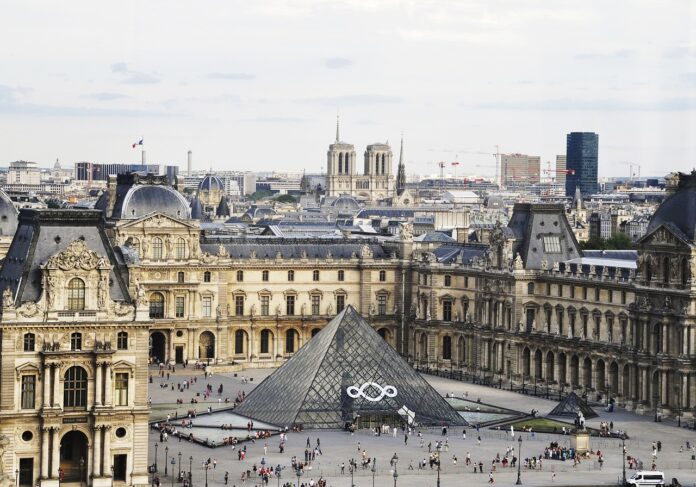29 Interesting Facts about France
- Location and Borders: France is located in Western Europe. It is bordered by Belgium, Luxembourg, Germany, Switzerland, Italy, Monaco, Spain, and Andorra. It also has coastlines along the Atlantic Ocean, the English Channel, and the Mediterranean Sea.
- Square: The country covers an area of approximately 551,695 square kilometers.
- National Currency: The currency of France is the Euro (EUR).
Interesting Facts about France:
- All champagne sold worldwide is produced in the Champagne region of France. If it is produced elsewhere, it is simply referred to as sparkling wine.
- The most visited museum in both France and the world is the Louvre in Paris, which was once a residence for French kings.
- France is one of the largest wine producers in the world, and in terms of vineyard area, it is second only to Spain.
- France is the most visited country on Earth, with over eighty million tourists annually. The United States is second with seventy-three million.
- France is considered the birthplace of Gothic art and has also preserved Baroque architecture. Initially, Gothic art was referred to as “French art.”
- Nicotine is named after Jean Nicot (1530-1600), a French diplomat and scholar who introduced tobacco from Portugal to France in 1559.
- French women often defy typical stereotypes. Many French women are shorter and fuller-figured.
- In France, it is customary to greet with a kiss on the cheek—even among male friends. This is a common social practice.
- The French tradition of releasing new vintage wines is held on the third Thursday of November, known as “Beaujolais Nouveau Day,” as mandated by law.
- The shortest reign in French history lasted just twenty minutes. Louis XIX was declared the new King of France but abdicated the throne just twenty minutes later.
- France was the first country to ban supermarkets from throwing away or incinerating unsold food. This historic decision was made in 2016, requiring all excess food to be donated.
- It is possible to marry a deceased person in France, although it requires presidential approval. During the ceremony, the living person stands next to a portrait of the deceased.
- The world capital of perfume is Grasse, France. Many perfumers have trained there, and the famous Chanel No. 5 was created in Grasse.
- Parisians love dogs, and pets are allowed in many public places, including some restaurants.
- The French coastline was not illuminated by lights until the 17th century to prevent pirate attacks.
- France has a significant number of pickpockets and scammers, with some of the most elaborate schemes. Both tourists and locals are often targeted by these criminals.
- France has a large number of châteaux: There are over 40,000 châteaux (castles) in France, with many dating back to the Middle Ages. The Château de Chambord and the Château de Versailles are among the most famous.
- The Eiffel Tower was not originally intended to be permanent: Designed for the 1889 Exposition Universelle (World’s Fair) to celebrate the 100th anniversary of the French Revolution, the Eiffel Tower was initially meant to be dismantled after 20 years. However, it was saved due to its usefulness as a radiotelegraph station.
- The French language is influential globally: French is spoken by over 300 million people worldwide, and it is an official language in 29 countries. It is also one of the working languages of several international organizations, including the United Nations and the European Union.
- France is home to some of the world’s best food: French cuisine is renowned globally, with dishes such as croissants, baguettes, and escargot. The country is also famous for its cheese, with over 400 varieties produced.
- The French invented the hot air balloon: In 1783, the Montgolfier brothers, Joseph-Michel and Jacques-Étienne, launched the first hot air balloon in France, marking the beginning of human flight.
- France has a unique legal system: French law is based on a civil law system, which is different from the common law system used in the UK and the US. French civil law is codified in the Napoleonic Code, which was established under Napoleon Bonaparte in 1804.
- The French Revolution led to significant global change: The French Revolution (1789-1799) was a pivotal event that led to the end of absolute monarchy, the rise of secularism, and the spread of democratic ideals around the world.
- France has a strong tradition in cinema: France is known for its influential film industry and is home to the Cannes Film Festival, one of the most prestigious and renowned film festivals globally.
- The country boasts several world heritage sites: France is home to 45 UNESCO World Heritage Sites, ranging from the historic center of Paris to the prehistoric cave paintings of Lascaux.
- France is a pioneer in fashion: Paris is considered the fashion capital of the world. The city hosts Paris Fashion Week, which is one of the most important fashion events globally, showcasing the latest trends and designs.
- French is known for its contributions to literature and philosophy: France has produced numerous influential writers and philosophers, including Voltaire, Jean-Paul Sartre, and Simone de Beauvoir.
- The country has a high-speed train network: France’s TGV (Train à Grande Vitesse) is one of the fastest train systems in the world, with speeds reaching up to 320 km/h (200 mph).
- France has a rich tradition of art and culture: The Louvre Museum, in addition to housing the Mona Lisa, has extensive collections of art and artifacts spanning thousands of years and various cultures.
